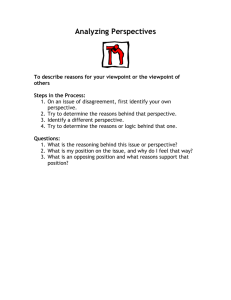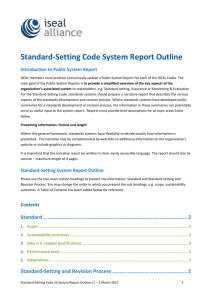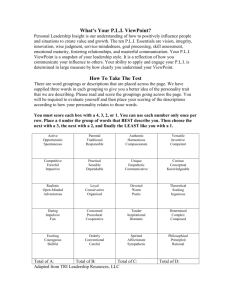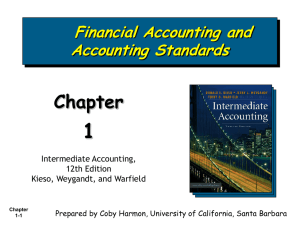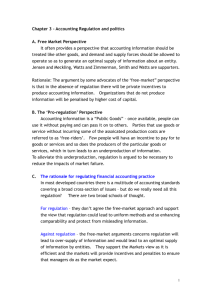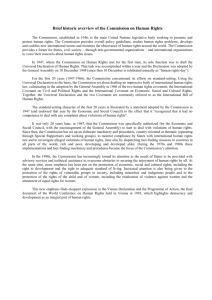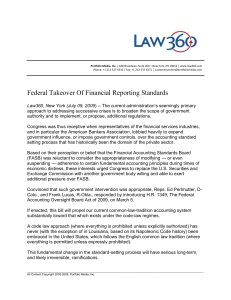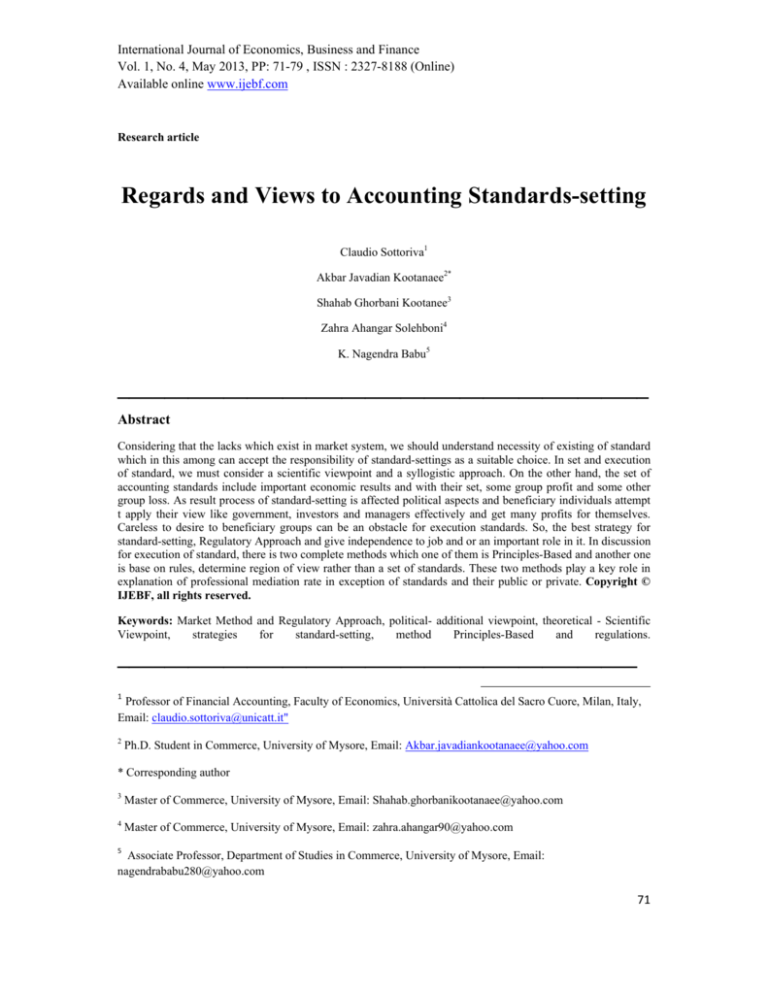
International Journal of Economics, Business and Finance
Vol. 1, No. 4, May 2013, PP: 71-79 , ISSN : 2327-8188 (Online)
Available online www.ijebf.com
Research article
Regards and Views to Accounting Standards-setting
Claudio Sottoriva1
Akbar Javadian Kootanaee2*
Shahab Ghorbani Kootanee3
Zahra Ahangar Solehboni4
K. Nagendra Babu5
_____________________________________________
Abstract
Considering that the lacks which exist in market system, we should understand necessity of existing of standard
which in this among can accept the responsibility of standard-settings as a suitable choice. In set and execution
of standard, we must consider a scientific viewpoint and a syllogistic approach. On the other hand, the set of
accounting standards include important economic results and with their set, some group profit and some other
group loss. As result process of standard-setting is affected political aspects and beneficiary individuals attempt
t apply their view like government, investors and managers effectively and get many profits for themselves.
Careless to desire to beneficiary groups can be an obstacle for execution standards. So, the best strategy for
standard-setting, Regulatory Approach and give independence to job and or an important role in it. In discussion
for execution of standard, there is two complete methods which one of them is Principles-Based and another one
is base on rules, determine region of view rather than a set of standards. These two methods play a key role in
explanation of professional mediation rate in exception of standards and their public or private. Copyright ©
IJEBF, all rights reserved.
Keywords: Market Method and Regulatory Approach, political- additional viewpoint, theoretical - Scientific
Viewpoint,
strategies
for
standard-setting,
method
Principles-Based
and
regulations.
____________________________________________
1
Professor of Financial Accounting, Faculty of Economics, Università Cattolica del Sacro Cuore, Milan, Italy,
Email: claudio.sottoriva@unicatt.it"
2
Ph.D. Student in Commerce, University of Mysore, Email: Akbar.javadiankootanaee@yahoo.com
* Corresponding author
3
Master of Commerce, University of Mysore, Email: Shahab.ghorbanikootanaee@yahoo.com
4
Master of Commerce, University of Mysore, Email: zahra.ahangar90@yahoo.com
5
Associate Professor, Department of Studies in Commerce, University of Mysore, Email:
nagendrababu280@yahoo.com 71
International Journal of Economics, Business and Finance
Vol. 1, No. 4, May 2013, PP: 71-79 , ISSN : 2327-8188 (Online)
Available online www.ijebf.com
Introduction
In discussion related to standard position method, is determined examining of free Market Approach and
Regulatory Approach hat Free Market is not suitable approach because of asymmetric information and free
riding and other reasons and the fall of market is witness this matter, in 1929. In contrast, Regulatory Approach
is more suitable choice for enactment of laws and regulations and establishment of SEC had been like is in
1934. So, in standard-setting by public or private sector, there are 3 kinds of Accounting Standard position
regimes which two types of it is private and one type of it is public. First groups include the countries which its
accounting job is responsible for standard-settings (for example, Canada, Hong Kong, Newsland, and Taiwan).
Second group includes countries that independent group in its
Spread Accounting Standards by a job (for example, America,
England). In fact, the second group is derived from first group
which American experience shows this subject. Third group
include the countries that the government is responsible for
enactment of accounting standards in it’s (for example,
Australia, China, France, and Malaysia). Some of these countries
like Australia are derived from first group. From the point of law
and regulation regulatory strategies, adjusted strategies are true
of first two groups. In the third group laws and regulations
spread by governmental laws monotonously. In fact the first two
groups have been more successful in set of accounting standards
and affected the third group countries. In relation to standardsetting method there are two viewpoints, political-additional and
theoretical -scientific viewpoints which examines in this article.
So, there are two viewpoints about standard-setting PrinciplesBased and standard-settings based on regulations about
enactment of laws and regulations that discusses in details.
Finally, the consideration is presented about planned discussions
in this article.
1. Standard-setting methods
In financial markets, legislation is necessary for producing information because of asymmetric information and
all people information of activities of management and private and inside information of firm, there is no reason
for supporting of persons. In addition to this vital problem, there are other problems that result in request for
producing information and then request for set of laws for producing of information.
For discussion about responsibility of process of standard-setting, there are
two vital questions:
First question is that the responsibility of set of accounting standards to free
market or Standard-settings authorities?
And second is that accounting standards should be collected in private or
governmental sector?
In relation to the first question, there are different viewpoint that are
discussed later.
1-1) Free Market Approach
Accounting can be considered as an informational industry means
accounting job is production of information. Supporters of free Market
Approach discuss that like ach production, in this trade must move supply
and demand elements. There is a need for accounting information by
costumers and a demand of its information by the firm in the financial inventories form. So, there is an average
price for accounting information among. Otherwise, this average price is reduced anywhere and is deleted that
72
International Journal of Economics, Business and Finance
Vol. 1, No. 4, May 2013, PP: 71-79 , ISSN : 2327-8188 (Online)
Available online www.ijebf.com
provider knows information suitably but costumer should be believed that this cost is equal to or less than
profits arising of information and consequently that information are not presented. In other word, Free Market
pressures are applicable for determining of kind of accounting information and necessary standards for
emphasizing their.
1-1-1) Agency Theory
Previous method is supported by some agency supporters. This theory tries to explain about agency relationship
among persons who work in institution specially in relation to accounting information. Because main important
element is accounting information, it is said that Agency Theory tries to explain about theoretical explanation of
accounting job.
Agency Theory is one the most important components of accounting positive theory. Evident theory is based on
individual profit that looks at an agency like a set of contracts. Because the people who activate in an agency ask
for individual profit, these contracts should be existed. Of course these contracts have cost like the cost that
spend for conversation to beneficiary persons or keeping of this approach. (Figure 1)
Figure 1: Positive Theory and Agency Theory6
Requesting for financial information can be classified in form of super vision purposes and decision-making and
Agency Theory takes care of requesting form position. Provisional relations are where manager transfers part of
decision-making to his agent. Based on positive accounting theory he two parties of contract act based on their
individual profits. Obvious example of Agency Theory is relationship among shareholders and managers of the
firm. Manager (of shareholders), preys care costs to sure that agent (of managers) act based on their profits. The
best example of care costs is financial inventories of auditing cost. On the other hand, for the agent present
particular about regard of manager profits, necessary costs are accepted by agent. The best example for
necessary costs, is financial inventories providing costs, because it cannot be supplied two parties profits in spite
of it, it must be paid another costs that is called remained costs.
6
Note: This Shape is plotted by Dr. Kambiz Forqandust Haqiqi to teach in accounting theory course.
73
International Journal of Economics, Business and Finance
Vol. 1, No. 4, May 2013, PP: 71-79 , ISSN : 2327-8188 (Online)
Available online www.ijebf.com
One example of these contracts can be replaced for public report. If accounting be regulated with help these
contracts again, then market mechanism can get enough information and get a balanced point which equals in
the cost and profit of providing information.
Supporters of this viewpoint believe that obligatory revealing is unnecessary and unsuitable because we can rely
on market force for providing each kind of information.
1-2) Regulatory Approach
Criticizers of Free Market Approach knows unreal this approach. In addition to this theory does not apply
because Market mechanism can't get balanced and suitable society price for accounting information. For this
reason accounting information is a public good and when the information gets out of the firm, it is available for
everyone. Because an inventory is not sent for all accounting information users, providers motive less for its
production and only mediation of regulatory organization s can force instructions providing necessary
information o supply actual request of guaranteeing efficient invest market. To this problem is said Free riding.
On the other hand, presentation of information is special to agency and agency desires to sell less information to
the highest price. So, in viewpoint of society, obligatory report provides a lot of information with less cost.
Even if there is efficient market accounting information, a regulatory organization is necessary, because users
can't be agreed about their needs and accountants do not agree about usable methods for getting information
where by a collected authority in necessary for decision-making.
1-3) Private or Public sector
The second question which we asked was that does Standard-setting should make in public sector or in private
sector?
In history time, there has been two methods for enactment laws and regulations, one European viewpoint and
another American viewpoint, which every one based on different philosophy in relation to need to laws and
regulations. In U.S.A the enactment law and regulations has made by Boards and independent commissions at
least since 1887 which supervise to Implementation method of laws and regulations too. Because some believe
in intensity of market approach, consequently ownership belongs to private sector and doesn't mediate except
for vital cases of government.
On the other side, it was looked at Market Approach badly until the Second World War consequently available
industries were national and governmental at that time mainly.
Nationalism was designed in direction of delete of political forces and against private exclusiveness and seemed
as economic development stimulus. But in recent 50 years, Europeans went to American viewpoint.
Standard-setting authority will be private in America under such condition actually and international standards
make gradually European accounting standards is changed and or the countries with the same course of action
(policy) give up legislator form and change in the form of private sector standards.
2- Political - additional, Theoretical - scientific viewpoint
Considering that account environment is base on Regulatory Approach a so standard-setting includes private
sector, how Standard-setting Board especially FASB should be considered to collect and performance of
accounting standards? Generally there is tow viewpoints in this connection:
Political- additional and theoretical - scientific viewpoints
2-1) political – additional viewpoint
The set of accounting standards include important economic results and with theirs set, same group profit and
same group loss. Consequently, process of Standard-setting is affected by political aspects and beneficiary
persons like government, inventors, and managers try to apply their view in this process effectively and thereby
get a lot of profits.
74
International Journal of Economics, Business and Finance
Vol. 1, No. 4, May 2013, PP: 71-79 , ISSN : 2327-8188 (Online)
Available online www.ijebf.com
Supporters of political- additional viewpoint look at political process of standard enactment and look at
accounting standard as parts of law. According to this viewpoint, FASB should be affected by policy not only
for creating standards but also for their survival. Dale L.Gerboth, one of authorities, states that "political process
of accounting legislation is not only unavailable but also fairly, because in a democratic society only political
institution and organization can apply their instructions." Also he believes that "when success of decisionmaking process is depended on confidence of society, these political problems can be important instead of
technical problems and in face to contract among adverse profits must ask for compromise and agreement
instead of financial answer."
If an accounting standard seems as part of law, that time policy will be existed unavailable. A Standard-setting
Board must be informed from political condition in these positions. It can't examine that whether a design is true
theoretically and is supported by experimental reason or not?
2-2) Theoretical- Scientific viewpoint
On the other hand, theoretical – scientific viewpoint is based on theoretical ad experimental reasons in support
of accounting standards and what is the focus point is not political or legal power but the power of reason is
contracting of people. In this viewpoint is emphasizes on use of Syllogistic Method in Standard-setting and use
of positive Method. (Figure 2)
Figure 2: Syllogistic approach in Theoretical – scientific viewpoint, the Method based on principle and
rules.
In practice, two viewpoints are used. Use of scientific viewpoint is the first step and following should be
considered political and economic process. In fact, structure of FASB and advantages of methods arising of
its process is the reality of accounting environment as discussed by supporters of political- additional
viewpoint.
3- Strategies for regulation of laws and regulations
Selection of suitable strategy by collectors will be an actual response to adverse of Regulatory Approach.
In practice, there are different strategies such as:
1.
Command and control: In this strategy, regulators of law and regulations determine carefully which
activities are acceptable and which activities should not be done and heavy penalty are considered to
offenders.
2.
Self -regulation: This strategy is used in Broads and professional institutions, this kind of
organizations enact a set of rules for their members. This is the same strategy which accounting job
tries to keep it.
75
International Journal of Economics, Business and Finance
Vol. 1, No. 4, May 2013, PP: 71-79 , ISSN : 2327-8188 (Online)
Available online www.ijebf.com
3.
Incentive-based regulation: example of this strategy is giving financial encouragers.
4.
Disclosure regulation: its example is revealing in regard to necessary information about articles of
food. Of course revealing of financial inventories isn't belonged to this group.
4- Execution of laws and regulations
On of designed criticism is guarantee of execution. Of course, discussion of guarantee of execution is
related to discussion about the effect of politics in accounting and influence on standard execution.
There are different methods in regard to standard execution that are classified to two methods that include
compliance approach and deterrence approach.
From 1973 to 2002 has been emphasized on syllogistic action in America standard schematic process. This
action from up to down place at GAAP, theoretical framework, standards and excusive example and
interpretations. Although it is possible that this approach be deleted for different reasons practically, and we
use of reasoning, but it has been attempted that deduction is the main method and induction method remains
exceptional.
In interpretational level has been used from this action for Standard-setting. In spite of this, there are many
differences among theoretical framework; international standards and America have been more complex
and detailed than international standards because of complex condition and special condition in it. In 2002,
SOX code was passed which consequently American large firms was disagreed. This code forced SEC to
test practicability of Standard-setting Method base on American principle. SEC suggested Standard-setting
Method. This was the time that financial accounting standard committee dependent to America accounting
instructor Board and firms like Pricewaterhouse Coopers emphasizes on base on principles. Finally, after
different discussions that were made among SEC, FASB and other professional Boards in America, FASB
concluded that accounting method has been rule base on regulations in America and it should direct to
Standard-setting Method base on principles. In fact this law made clearness differences between two
standards setting authorized and also made that is designed a new discussion in standard.
Investigation and comparison of America and the International Accounting Standards by various
authorities, including the SEC, FASB, IASB and other accounting professional associations conducted
generally two methods in the execution of the standards.
One of them is standard execution Principles-Based which is an acceptable method emphasizing on free
action for professional Judgment and another method is regulation and execution of standard on rule based
method that is an obstacle method which emphasizes on this matter that Standard-setting authority adjudges
instead of work.
1. Standard-setting method Principles-Based
A- Definition:
Principles are general statements which are supported by many and try to support of fact and impartiality
and act like director.
Principles can't replace regulations and sometimes it is possible that a set of regulations utilize as director
of applying principles but we need to adjudge for emphasizing monotone this regulations.
B- Advantages:
1. Large direction for different conditions.
2. Use of professional judgment.
3. Simplification of standards.
4. Preventing of alteration and showing actual activity of firm.
76
International Journal of Economics, Business and Finance
Vol. 1, No. 4, May 2013, PP: 71-79 , ISSN : 2327-8188 (Online)
Available online www.ijebf.com
C- Disadvantages:
1.Reduction of contract capability (Reason of using regulations sometimes)
2.Factor of unavailability for enough reasons for presentation to legal courts (desire to reduction of
responsibility at job)
2. Standard-setting Method base on regulations
A- definition:
It is an obvious decision-making Method, which there is no intensive doubt in relation to time and how use
of it. Special direction has been presented by this method and sometimes it has been arbitrary and doesn't
follow from special principles.
B- Advantages:
The most important advantages of it is increasing of capability among the firms.
C- Disadvantages:
1.
It is used for circling of standards
2.
It is made (causes) unnecessary of standards
3.
Increases accountants
4.
Make pale the professional judgment
Lease accounting, based on American accounting standards is the best example for presentation of the
difference between these two methods. Use of 75% and 90% two conditions in " lease Accounting " in
American standards is the sensible example Rules-Based and international accounting standard of lease which
uses a professional judgment instead of presentation of percentage for determining kind of lease is the clear
method Principles-Based.
Consequently international accounting standards used of the first method and American accounting standards
used of the second method. So, from 2002 thereafter created this discussion that before designing of discussion
syllogism and its hierarchy in Standard-setting should determine dominant viewpoint on this set. Standardsetting method base on regulations had showed its inefficiency practically and considering that legal necessity,
FASB decided to use some positive aspects of Standard-setting method Principles-Based and bring near IASB
viewpoints himself. SEC has allowed to outside (foreign) special firms that present American Stock Exchange,
present their financial inventories based on international financial report standard from 2009 thereafter and there
is no need to balance of financial inventories from international financial report standards based on America
accepted accounting principles. So, SEC tries to determine a suitable time allow to American public firms to use
of international financial report standards for providing of financial inventories. A set of these cases caused start
of short tie and long time symmetric projects between IASB and FASB. This Approach caused that two
important action happen. Firstly, discussion of symmetry of these two authorities it means that America doesn't
like to translate international financial report standards text carefully and present in America and another
important point is that even though it seems apparently that problem has been solved but the differences was
deeper than this and finally, FASB was connected to international accounting standards. Because with the lapse
of time from starting of important projects like identification of income and common theoretical framework
hasn't gotten final any result. (Up to now a suggested text has been published in relation to qualitative properties
and first introduction in relation to the personality of report in relation to theoretical framework project and two
first introduction in relation to identification of income).
In last change, FASB published two new standards in relation to mix and minority shared that in spite of it be
near to international accounting standards, in some cases differences from international financial report
standards. So, manager of IASB is unsatisfied from current condition and says that at least 20 years is necessary
77
International Journal of Economics, Business and Finance
Vol. 1, No. 4, May 2013, PP: 71-79 , ISSN : 2327-8188 (Online)
Available online www.ijebf.com
to result from symmetry discussion with America and says that finally it is possible that we reach everywhere
that two authorities work on standard-setting along with each other.
5. Conclusion
Free Market Approach isn't a suitable approach for enactment accounting standards because of asymmetry
information and free riding and other reasons that exist and the fall of market is witness of this matter. In
contrast, Regulatory approach is more suitable choice for enactment of laws and regulations and establishment
of SEC has been too in 1934. So, there is 3 types of regimes of accounting standard enactment that two cases of
it is private and one case of it is governmental. The first group include the countries that accounting job is
responsible for standard-settings (for example, it can be refer to Canada, Hong Kong, Newsland and Taiwan),
The second group includes the countries that independent group with help of job spread accounting standards
(America, England are of this type) , In fact the second group has been derived of firs group as America
experience presents this matter. The third group includes the countries that in their government are responsible
for enactment of accounting standards (which obvious example of it is Australia, China, France and Malaysia).
Some of these countries like Australia is derived of the first group. Self-regulatory strategy is true of two first
groups and in the third group, laws and regulations and spread by government laws monotonously. Of course
international standards has made that the third countries are desired to method of the first and the second groups.
In relation to set and standard execution as referred must be considered syllogistic and scientific approach and
so standard-settings must be made in direction of increasing of quality of decision-making and reduction of
informational asymmetry. As professor May and Sandem say that “Social welfare resulting from accounting
reports has known obviously. As a result, It isn’t surprising that say FASB is a political authority and
consequently the process of choice of an acceptable accounting method accounts a political process. As a result,
FASB must consider political aspects (for example social welfares) with theory and accounting researchers in
his decision-makings “. It must be considered that different groups ask for accounting standards for their profits.
If a standard has a converse effect on their profits, it is expected that each work for preventing of creating of the
standard. Political- additional viewpoint looks at political the process of standards and looks at accounting
standards as part of law. Based on this viewpoint, Standard-setting authorities consider politics not only for
creating standards, but also for their survival and of course collect authority must be considered that doesn’t
change in to a political tool. In discussion of ex enactment laws and regulations, the best method, Standardsetting Principles-Based approach. Although it is possible some countries considering their special conditions,
use of Standard-setting method based on regulations, but considering disadvantages of method based on
regulations, these countries must try to provide necessary background for execution of Standard-setting method
by a special program. Also IRAN needs a set of integrated and coordinated accounting standard corresponding
to its special culture and condition and also must determine our method in standard-setting. (Principle follower
or regulation follower), perhaps this isn’t authentic that texts translate from England, Australia, Canada,
America and International without regard to Standard-setting method and present as a standard or direction of
applying.
References
[1] Michael Gaffikin, Accounting Research and Theory: the age of neoempiricism, Working Papers Series,
05/07, (www.uow.edu.au/commerce/accy/ ).
[2] Michael Gaffikin, Regulation
(www.uow.edu.au/commerce/accy/ ).
as
Accounting
Theory,
Working
Papers
Series,
05/09,
[3] Noruzi, Ebrahim and Mohsen Khoshtinat, Political process of Accounting, Hesabdar Journal, Vol 22, Issue
78
[4] Rebecca Toppe Shortridge and Mark Myring, Defining Principles-Based Accounting Standards, CPA
Journal, August 2004.
[5] Robert May and Sundem, "Research for Accounting Policy: An Overview, "Accounting Review, October
1976, p.750.
[6] Simplifying Global Accounting, Journal OF Accountancy, July 2007
78
International Journal of Economics, Business and Finance
Vol. 1, No. 4, May 2013, PP: 71-79 , ISSN : 2327-8188 (Online)
Available online www.ijebf.com
[7] The Institute of Chartered Accountant of Scotland, Set of manuscript about Standard-setting Rules-Based
and Principles-Based. (http://www.icas.org.uk/site/cms/contentviewarticle.asp?article=4966)
[8] Vernon Kam, Accounting theory , 2nd edition , chapter18
79

